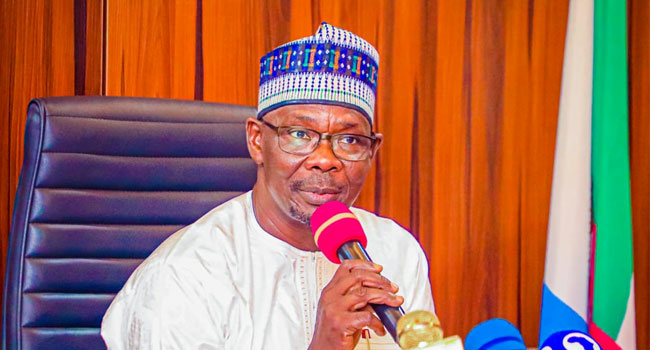The governor of Nasarawa state, Abdullahi Sule, has attributed the underdevelopment of the northern region to many factors, including lack of focused and committed leadership, insufficient power supply and infrastructure, as well as Federal government policies.
Sule, the North Central Governors’ forum chairman, said this when he appeared on Monday on Channels Television’s Politics Today programme.
Answering questions about why the region remains backwards, he said, “There is no single reason you can see. This is the only reason why we had all these problems. It’s a combination of so many factors: lack of focus on the part of leadership and lack of commitment on the part of the employees.
“Sometimes, federal government policies about imports and things like that. Lack of sufficient power in the country to power all these industries.
“Lack of infrastructure and lack of funding. You know, so these are some of the combinations of the reasons. So when people keep saying that it’s leadership, it’s leadership, it’s not just leadership. You know, you have so many other problems lined up.”
According to Sule, the discovery of oil in the country also contributed to the problem, as other sectors, such as agriculture, had been given less attention.
“Now, with the discovery of oil and free money coming to every state, we relaxed. You know, and you think that the oil money will be forever. And for that reason, that’s where the lack of focus came in. So today, God is so kind, you know, we have an abundance of opportunities to correct some of these things,” he said.
At the Northern Nigeria Investment and Industrialisation Summit, which is being held between Monday and Tuesday, Sule said: “I think that’s the whole idea of this summit. I want to thank Professor Ango Abdullahi, the leader of the Northern Elders Forum.
“They came together with another group called the Northern Economic Agenda Initiative. You know, to come up with this idea of the summit. And like you indicated, the summit would now be specific on three significant areas.
“We don’t want to go and pick up, you know, building, manufacturing of an aircraft, or this and that, because sometimes we come up with some humongous ideas that are not practical. Wild elephant. Wild elephant ideas. They came up with these three areas, which made me so happy about the presentation.
“In my presentation, I mentioned to them that, okay, agriculture, for urban power, and mining will not work until we tackle security. And we’d better stop blaming anybody for security. Let every state take some initiative to resolve our internal security challenges.”
He stated, “Every state at the moment has some resources to a certain extent, so if you design your plan well, you should be able to handle your internal security to a specific limit.
“It’s not just about empowerment, to take free money and give it to others. It’s not just that. You know, there are so many other things that we need to do to resolve our internal security challenges, not continuously looking at the federal government to come in and then solve our problem. Because if that’s the case, we’ll continue to be frustrated. So that’s the idea.”
On agriculture and other investments in Nasarawa state and other parts of the country, Sule said, “We are going to form a committee. The federal government actually wants to have grazing reserves. The federal government will pay for that.
The federal government will engage in agricultural activities in these zones. It wants to ensure they are located in areas with already functional infrastructure. The federal government is going to do this exactly as you said.
“And today, we ended the event by signing a charter that we will pursue shared interests. Certain states are outstanding in the so-and-so crop. We concentrate on that area. Certain states are perfect for mining.
“Today, the minister said that we can concentrate on mining lithium in places like Nassarawa, and focus on mining gold in places like Zamfara. Today, he just mentioned that. That’s why I explained at the meeting during my own speech.
“I said, for Nassarawa, we are looking at areas of competitive advantage. We will not be looking for places where we are not strong. If you are going to bring up any areas, about clearing cattle or something like that, we are not very good at that. We will not be able to do that.
“But if you bring the areas where we are strong, I say we are not just looking for investors. We are also looking for partners where we will invest. We usually like to know whether you will acquire the land. Will you prepare the land? Will you develop some infrastructure? That will be our equity in the business. And then somebody comes in, you know, and says, What do you invest in?
“…The real GDP today, you know, for the second quarter, was 26%. That’s the highest contributor. So if you expand agriculture, you do more in agriculture. Every state can do that. We can now feed other countries that cannot do agriculture. Niger, Cameroon, Chad, Mali, you can all feed them from here. But that is on one side. On the other hand, this mining that you are talking about will be a replacement for oil.
“Now, one of the areas we focus on today, I heard that northern Nigeria can generate a lot of energy. But you know, northern Nigeria is also looking at other areas. The AKK line starts from the north, and ends in the north…”
Sule also dismissed claims that Dangote Petroleum Refinery sacked 800 Nigerian workers, saying such an action would be inconsistent with the refinery’s operational needs.
Responding to allegations by the Petroleum and Natural Gas Senior Staff Association of Nigeria (PENGASSAN), which accused the refinery of dismissing 800 Nigerian workers for joining the union, he said the refinery requires thousands of skilled workers to function and cannot simply lay off staff.
“I don’t think that’s what happened. I don’t think Dangote will wake up one morning and say 800 people are gone. I don’t want you. It’s not like that,” the governor stated.
He explained that the refinery had previously employed thousands during construction and invested in training its workforce.
“Dangote woke up one day and employed over 4,000 employees to build the refinery when it started. By the time they finished, they had over 10,000 in building that refinery. He didn’t just wake up to do that.
“Therefore, he will need people to run that refinery, whether he wants it or not. He needs competent people to do that. And all those people I’m talking about have been sent for training.
“The distillation unit alone of that refinery is equivalent to a 40-storey building. You can’t afford, in any system, to have something like that broken down. So, you need people to carry on with the operation, which is 24 hours,” he said.
While commending the federal government for wading into the matter, Sule said, “I’m so happy now that the federal government has intervened, which is the right thing to do. Because it is not in the federal government’s interest to see institutions running down, no matter how small they are, not to mention these homogeneous institutions of Dangote Refinery.”





